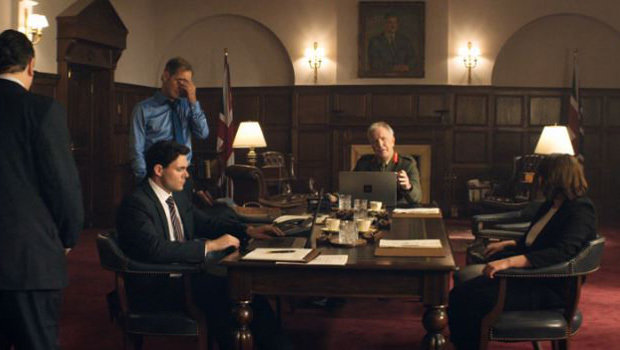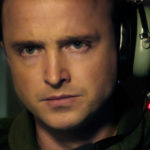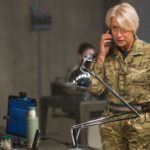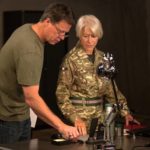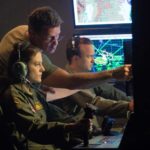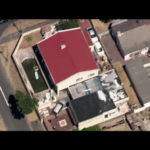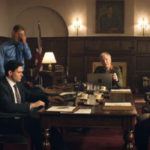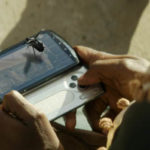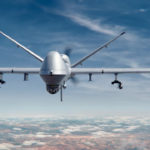“Collateral Damage: injury inflicted on something other than an intended target; specifically civilian casualties of a military operation”
“Don’t ever tell a Military Man he doesn’t know the cost of war” – Lieutenant-General Frank Benson in Eye In The Sky
The subtitle of Eye In The Sky might be “what would you do if…?” The movie skilfully peels away the layers of decision making and ethical dilemmas of modern drone warfare, the kind where the top military brass are not only behind the lines but sitting comfortably sipping tea at the Cabinet Office in Whitehall or at the Pentagon.
All the protagonists but one are safely hidden away using satellite technology to view the antagonists and to determine what they are up to before deciding how to proceed, but they are not all happy bunnies: the military huff in frustration, the politicians look craven and shifty, the legal experts try to cover their arses. It’s not a happy day at the office.
The decision required is this: a drone strike would wipe out three of the top Al Shabaab targets in East Africa (the film being set in a Somali district in Nairobi) and, crucially, prevent two suicide bombers from killing dozens of people. Fresh in the memories of all concerned are the attack on a Nairobi shopping centre, killing 67 and injuring hundreds more (see here.)
Approval is sought from the great and the good in various other locations to change the rules of engagement from surveillance to attack, once it is learned that suicide vests are being deployed. Initial objections from the Attorney General (Richard McCabe) and are swatted aside by reference to the Foreign Secretary (Iain Glen), but the fly in the military ointment is the presence of an innocent young local, selling homemade bread a few feet from the proposed target point, who is gloriously unaware of all the attention she has caused.
Collateral damage must be estimated – can it be reduced sufficiently to justify the risk of killing an innocent young girl, whose death would be used for propaganda purposes? What would you do: go in all guns blazing, and to hell with the consequences? The stakes are high, though from the military perspective taking out your top targets is a no-brainer; politicians demur because their eyes are on the newspaper headlines and social media (ie. their own future popularity.) Perhaps the key message is that this is ultimately a debate about self-interest and your own legacy?
The ongoing dilemmas take the form of claustrophobic discussions in various rooms, yet the situation on the ground is critical. One of the Nairobi men is at the scene, a Kenyan undercover agent called Jama Farah (Barkhad Abdi) whose initial job is to launch and control a science fictional spy device in the form of a beetle to look into all the rooms in the house while avoiding the Al Shabaab guards all around clocking and potentially executing him. Once the girl’s presence is sussed, he has the delicate task of buying the girl’s bread so she goes home and therefore out of the target zone.
Meanwhile, Col Powell (Helen Mirren) is leading operations and liaising with Lt-Gen Benson (the late and much lamented Alan Rickman, here in his final film role), in attendance at the COBRA security meeting in Whitehall, and with Lt Col Ed Walsh (Gavin Hood) and his 2nd Lieutenant drone pilot Steve Watts (Aaron Paul) and sidekick A1C Carrie Gershon (Phoebe Fox.)
A word first on Rickman, to whom the film is dedicated. Here he does that thing that Rickman always did best: with an air of quiet calm he raises his eyebrows and speaks in a manner that can only be described as “pointed”, a ploy infinitely more effective than ranting and raving. Nobody ever did it better than Alan Rickman, and I doubt if they ever will. This is a fitting finale to a great career as a character actor and occasionally a menacing Hollywood villain.
Neither could you complain about Helen Mirren in a role that is a couple of steps removed from her typical role – whatever that is. Being the fine and consummate actor that she is, stepping into the shoes of a senior and slightly testy military intelligence officer she takes within her stride, particularly when her character tells a subordinate to cheat the collateral damage estimates in order to ensure the mission is approved. To Col Powell and Gen Benson, the ends firmly justify the means, and it is for the politicians to deal with the aftermath, the shades of which opinion are tautly drawn.
A word too for young Aisha Takow, about whom I can find very little but who does a splendid job of portraying innocence taken in the interests of a bigger game. But if anyone steals the acting honours it is Abdi, who you will recall was justifiably lauded for his debut in Captain Phillips. Abdi is an instinctive actor, one capable of articulating subtle nuances of thinking and feeling with minimal gestures, a flick of the eye, a hand movement. Such a shame that he will probably never be a leading man, since a slender black actor with Somalian roots is invariably type cast in character roles requiring a slender black actor with Somalian roots, such is the modus operandi of Hollywood casting. It is a joy to see him acting with such care and precision in a key role.
However, I can’t say the same of either Mr Paul or Ms Fox, both of whom came over as supremely unconvincing. Why? A drone pilot would never question orders, still less blub on duty about the fate of an innocent civilian. Moist-eyed performances have to serve the context in which they are set, but Aaron Paul’s character would not break with his professional duty for so much as a second – and if he did, chances are that his military career would end soon thereafter.
For making what could easily have been a talking heads non-event, full credit to writer Guy Hibbert and director Gavin Hood (yes, the same Gavin Hood mentioned above) for creating both tension and an experience that is fully cinematic and fully watchable at all times. The inclusion of some humour (the general wondering which doll to buy his granddaughter, the US Secretary of State playing table tennis as a visitor of the Chinese) helps vary a mood that could otherwise veer towards the po-faced. This is a serious film, but not one that takes itself too seriously at all times
The intent of the drama is beautifully underscored by dramatic photography and a subtly effective score, but the greatest piece of direction is achieved through minimalism: as the bomb explodes and obliterates the house in which the suspects, including both British and American nationals, are located, the scene is conducted in total silence. Never underestimate the power of silence.
Hibbert and Hood shade out the realities, the complications and the complexities of military decisions that are made almost daily in the real world, but while the politicians do not come out of this scenario smelling of roses, the inevitable and tragic death of Alia does not presuppose the military’s “shoot to kill” view to be right either.
It’s perfectly possible to come out of EITS with the same opinions with which you entered the cinema, or to find your view changed in any direction, but at least you will have a better appreciation of the consequences of any decision decision made. Is life expendable and are some lives worth more than others? Is trading one life for the potential of others justified? You decide!

